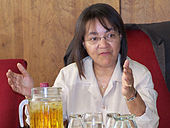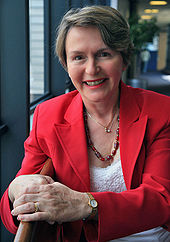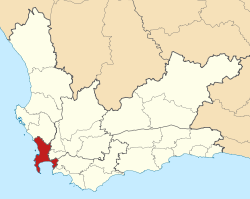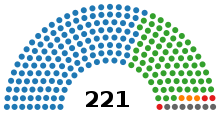- City of Cape Town
-
This article is about the municipality. For the city itself, see Cape Town.
City of Cape Town
Stad Kaapstad
IsiXeko saseKapa— Metropolitan municipality — 
FlagMotto: This City Works For You Location in the Western Cape Coordinates (Civic Centre): 33°55′17″S 18°25′44″E / 33.92139°S 18.42889°ECoordinates: 33°55′17″S 18°25′44″E / 33.92139°S 18.42889°E Country  South Africa
South AfricaProvince Western Cape Municipal ordinance 1839 Unicity created 2000 Seat Cape Town Subcouncils 23- Blaauwberg Subcouncil
- Bergdal Subcouncil
- De Grendel Subcouncil
- Tygerberg Subcouncil
- Central Subcouncil
- Bellville Subcouncil
- Koeberg Subcouncil
- Helderberg Subcouncil
- Nxele Makana Subcouncil
- Charlotte Maxeke Subcouncil
- Looksmart Solwandle Ngudle Subcouncil
- Mitchell's Plain Subcouncil
- David Mthetho Ntlanganiso Subcouncil
- Miranda Ngculu Subcouncil
- Pinelands Subcouncil
- Good Hope Subcouncil
- Athlone & District Subcouncil
- Rondevlei Subcouncil
- South Peninsula Subcouncil
- Protea Subcouncil
- Oostenberg Subcouncil
- Lizo Nkonki Subcouncil
- Adelaide Tambo Subcouncil
Government - Type City council - Mayor Patricia de Lille (DA) - Deputy Mayor Ian Neilson Area[1] - Total 2,454.72 km2 (947.8 sq mi) Highest elevation 1,590.4 m (5,218 ft) Lowest elevation 0 m (0 ft) Population (2007)[2] - Total 3,497,097 - Density 1,424.6/km2 (3,689.8/sq mi) - Households 902,278 Racial makeup[3] - Coloured 44.0% - Black African 34.9% - White 19.3% - Indian or Asian 1.8% Languages[4] - Afrikaans 41.4% - Xhosa 28.8% - English 28.0% Time zone SAST (UTC+2) Area code 021 Vehicle registration CA/CF/CY/CEY/CFM/CFR Municipal code CPT Website www.capetown.gov.za The City of Cape Town (Afrikaans: Stad Kaapstad; Xhosa: IsiXeko saseKapa) is the metropolitan municipality which governs the city of Cape Town, South Africa and its suburbs and exurbs. As of 2007, it had a population of 3,497,097.[2]
The remote Prince Edward Islands are deemed to be part of the City of Cape Town, specifically of ward 55.
Contents
History
Cape Town first received local self-government in 1839, with the promulgation of a municipal ordinance by the government of the Cape Colony.[5] When it was created, the Cape Town municipality governed only the central part of the city known as the City Bowl, and as the city expanded, new suburbs became new municipalities, until by 1902 there were 10 separate municipalities in the Cape Peninsula.[6] During the 20th century, many of the suburban municipalities became unsustainable and merged into the Cape Town municipality or combined with other suburbs; but at the end of apartheid in 1994 the metropolitan area was still divided up into several[vague] separate municipalities.
As part of the post-1994 reforms, municipal government experienced a complete overhaul. In 1996 the Cape Town metropolitan area was divided into six municipalities – Cape Town/Central, Tygerberg, South Peninsula, Blaauwberg, Oostenberg and Helderberg – along with a Metropolitan Administration to oversee the whole metropolitan area. At the time of the 2000 municipal elections these various structures were merged to form the City of Cape Town as a single metropolitan municipality governing the whole metropolitan area. It is for this reason that the City of Cape Town is sometimes referred to as the "Unicity".
Government
Cape Town is governed by a 221-member city council, which chooses the executive mayor, who in turn chooses an 11-member Mayoral Committee. The city is divided into 111 electoral wards; each ward directly elects one member of the council. The other 110 councillors are elected by a system of party-list proportional representation. The city manager is the non-political head of the city's administration.
After the creation of the "unicity" from the six previous municipalities, the city was divided into 16 subcouncils, later increased to the present 23. Subcouncils are consist of geographically clustered wards with proportional councillors assigned to them and led by a subcouncil chairman who is elected by a majority vote of each subcouncil.
 Mayor Patricia de Lille.
Mayor Patricia de Lille.
Executive incumbents
See also: Mayor of Cape TownWith the Democratic Alliance (DA) having won an absolute majority of council seats in the election of 18 May 2011, its mayoral candidate Patricia de Lille was formally elected mayor on 1 June.[7] Before the election, the executive mayor was Dan Plato of the DA. He was preceded by Helen Zille, now Premier of the Western Cape.[8] The current executive Deputy Mayor is Ian Neilson.
The current city manager is Achmat Ebrahim, who was appointed in April 2006.
Council seat breakdown
The following table shows the distribution of seats in the council after the election of 18 May 2011:
Seats in the Cape Town City Council after the election of 18 May 2011[9] Party Ward PR top-up Total Percentage Democratic Alliance 78 57 135 61.1% African National Congress 33 40 73 33.0% African Christian Democratic Party 0 3 3 1.4% Congress of the People 0 3 3 1.4% Africa Muslim Party 0 1 1 0.5% Al Jama-ah 0 1 1 0.5% Cape Muslim Congress 0 1 1 0.5% National Party 0 1 1 0.5% Pan Africanist Congress 0 1 1 0.5% United Democratic Movement 0 1 1 0.5% Freedom Front Plus 0 1 1 0.5% Total 111 110 221 100.0% Electoral history
 Helen Zille, former mayor of the City of Cape Town.
Helen Zille, former mayor of the City of Cape Town.
In the 2006 local government election, the Democratic Alliance (DA) was the largest single party and took 90 of the 210 seats on the council, ahead of the African National Congress (ANC) which took 81 seats, but with no party holding a majority. The Independent Democrats (ID) led by Patricia de Lille initially took 23 seats.[10]
Helen Zille was elected executive mayor on 15 March 2006 by a 3-vote margin of 106 votes against former incumbent executive mayor Nomaindia Mfeketo who received 103 votes, including 22 votes from the ID (one rebel ID councillor voted for Zille). Helen Zille formed a DA-led coalition, also known as the Multi-Party Government with the support of six smaller parties who collectively became known as the Multi-Party Forum parties with a combined total of 105 seats out of 210 (a narrow one-seat majority) in the council. Andrew Arnolds of the African Christian Democratic Party (ACDP) was elected executive deputy mayor and Jacob "Dirk" Smit of the Freedom Front Plus (FF+) was elected the speaker who also serves as the chairperson of the council meetings. The DA gained one seat in a June 2006 by-election held in Tafelsig (Mitchell's Plain) which was taken from the ID when the rebel ward councillor Sheval Arendse resigned to join the DA in order to protest the ID decision to vote with the ANC in the mayoral election and this doubled the coalition's majority to two seats. In January 2007 the DA-led coalition had increased its majority, by introducing the Independent Democrats (22 seats) to the coalition following the expulsion of the Africa Muslim Party (three seats) from the coalition when it supported a failed bid by controversial councillor Badih Chabaan (who demanded the deputy mayor's post) to oust Helen Zille and the DA and form a coalition with the ANC. As a result of the ID's support, the DA-led coalition increased its majority of two seats (106 seats) to 40 seats (125 seats) resulting in a much more stable coalition. As a result of the ID joining the coalition, Andrew Arnolds stepped down to allow Charlotte Williams of the ID to became executive deputy mayor on 31 January 2007. In the pivotal Hout Bay by-election in February 2007, the DA retained a safe seat and strengthened its position in Hangberg, a coloured fishing community.
During the recent floor-crossing period in September 2007, the DA increased their share of seats by four seats from 91 to 95, while the ID lost six seats, dropping to 16 seats from 22, primarily at the expense of the DA which gained two ID councillors, and the newly-formed National People's Party (NPP), led by controversial former councillor Badih Chabaan, which gained three ID councillors and one AMP councillor. Another new party was formed named the Social Democratic Party (SDP) which took one seat from the ID as well. The ANC did not lose or gain a seat and stood at 81 seats. Following the floor-crossing period, Charlotte Williams of the ID announced her resignation as deputy mayor and there was uncertainty over who would replace her. Under the terms of the coalition agreement since March 2006 the position of deputy mayor was to be given to the ACDP. However Mayor Helen Zille had rejected four of the ACDP's nominations for the post and insisted that a DA member take the post. A row broke out between the two parties when Zille stated that the ACDP did not hold the balance of power and was stubborn over controlling the post for the DA. However after more than a month of the impasse which was accompanied by several rounds of negotiations, Zille conceded the post to the ACDP. On 31 October 2007, Grant Haskin of the ACDP was elected the third executive deputy mayor since Zille came to power. The DA lost one council seat after a by-election in Macassar in March 2008 which was unexpectedly won by the ID in an upset victory for a party which was a major partner in the coalition. Thus the by-election outcome had no impact on the DA-led coalition's position in the council other than to bolster the ID's position after it was dealt a blow in the floor-crossings.
After the March 2006 local government elections the DA controlled thirteen subcouncils, followed by the ANC with seven, the ACDP with two, and the ID with one. After the floor crossing in September 2007 the subcouncils were reconstituted with fifteen going to the DA, four to the ID, two to the ACDP while the ANC retained only two after losing five subcouncils.
Geography
The municipality has a total area of 2455 km².[1]
Adjacent municipalities
- Swartland Local Municipality, West Coast District Municipality (north)
- Drakenstein Local Municipality, Cape Winelands District Municipality (northeast)
- Stellenbosch Local Municipality, Cape Winelands District Municipality (northeast)
- Theewaterskloof Local Municipality, Overberg District Municipality (southeast)
- Overstrand Local Municipality, Overberg District Municipality (southeast)
The City of Cape Town is also bounded by the Atlantic Ocean to the south and west.
See also
- Cape Town
- Metropolitan municipality (South Africa)
- List of Cape Town suburbs
- Western Cape Anti-Eviction Campaign
References
- ^ a b "City of Cape Town". Municipal Demarcation Board. http://www.demarcation.org.za/PortalPages/Info_1.aspx?type=Metropolitan&code=CPT&Prov=Western%20Cape&sT=Metropolitan&to=&frm=home. Retrieved 19 October 2009.
- ^ a b "Community Survey, 2007: Basic Results Municipalities" (PDF). Statistics South Africa. http://www.statssa.gov.za/Publications/P03011/P030112007.pdf. Retrieved 23 March 2008.
- ^ "Community Survey 2007 interactive data". Statistics South Africa. http://www.statssa.gov.za/community_new/content.asp?link=interactivedata.asp. Retrieved 19 October 2009.
- ^ "Census 2001 interactive data". Statistics South Africa. http://www.statssa.gov.za/census01/html/C2001Interactive.asp. Retrieved 19 October 2009.
- ^ Worden, Nigel; van Heyningen, Elizabeth; Bickford-Smith, Vivian (1998). Cape Town: The Making of a City. Uitgeverij Verloren. pp. 171–177. ISBN 9065501614. http://books.google.com/books?id=ntsyoxWIB44C.
- ^ Worden, Nigel; van Heyningen, Elizabeth; Bickford-Smith, Vivian (1998). Cape Town: The Making of a City. Uitgeverij Verloren. pp. 221–223. ISBN 9065501614. http://books.google.com/books?id=ntsyoxWIB44C.
- ^ Adams, Nathan (1 June 2011). "De Lille receives Cape Town mayoral chain". Eyewitness News. http://www.eyewitnessnews.co.za/Story.aspx?Id=66964. Retrieved 1 June 2011.
- ^ Phillip, Bulelani and Essop, Philda. "It's Mayor Zille for Cape Town". Cape Argus. p. 1. http://www.iol.co.za/index.php?set_id=1&click_id=13&art_id=vn20060315143000635C914503. Retrieved 15 March 2006.
- ^ "Seat Calculation Detail: City of Cape Town". Independent Electoral Commission. 21 May 2011. http://www.elections.org.za/content/LGEPublicReports/197/Seat%20Calculation%20Detail/WP/CPT.pdf. Retrieved 21 May 2011.
- ^ "Seat Calculation Summary: City of Cape Town" (PDF). Independent Electoral Commission. 2006. Archived from the original on 18 March 2006. http://web.archive.org/web/20060318004628/http://www.elections.org.za/lgeresults/Static+Report/95/Seats+by+Municipality+LCMC/CPT-1.pdf. Retrieved 15 March 2006.
External links
Metropolitan
municipalityCity of Cape Town
District
and local
municipalitiesCategories:- Government of Cape Town
- Metropolitan Municipalities of South Africa
- Municipalities of the Western Cape
Wikimedia Foundation. 2010.


